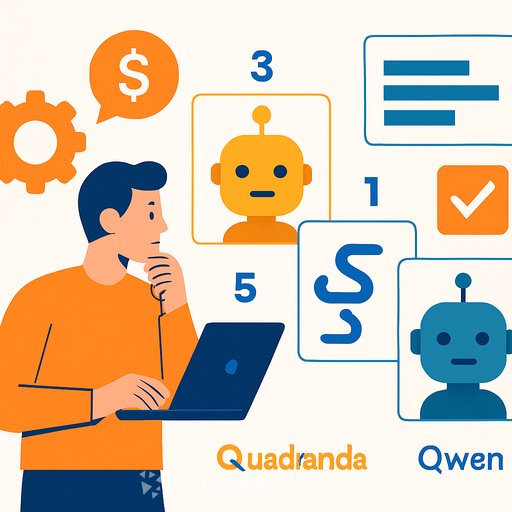ChatGPT-5 vs Claude vs Qwen: The Hidden Costs of Picking the Wrong AI Model
Choosing the right AI model can make or break your app development project. With AI technology advancing quickly, developers face a critical decision: which model balances speed, reliability, and cost effectively? Three major players—ChatGPT-5, Claude, and Qwen—stand out, each with distinct pros and cons that could influence your project's outcome.
Consider building an app like “Newsletter Digest,” which summarizes newsletters from Gmail. If your AI model falls short, your app might never reach functional status. This comparison uses the development of “Newsletter Digest” as a practical example to reveal each model's strengths, weaknesses, and hidden costs. Whether you prioritize reliability, creativity, or speed, this breakdown will clarify what to expect from these AI options.
AI Model Comparison Summary
- Claude (Opus 4.1 and Sonnet 4): The most reliable for building a functional app with few errors but comes at a higher price.
- GPT-5: Versatile and strategic but requires more troubleshooting, making it less efficient than Claude.
- Qwen Coder: Fast response times but struggles with reliability and completeness, better suited for simpler projects.
The app was built using Next.js, Tailwind CSS, Neon, Prisma, and Clerk, which streamlined development and user management. Cost-wise, Claude topped the expense list, GPT-5 sat in the middle, and Qwen offered the lowest cost but less reliability.
Project Overview: Developing “Newsletter Digest”
“Newsletter Digest” connects to Gmail, collects newsletters, and summarizes key stories in a user-friendly interface. The tech stack included:
- Next.js: For a dynamic, efficient front end.
- Tailwind CSS: Enabling clean, responsive design.
- Neon: Postgres database for managing data.
- Prisma: Simplifies database schema management.
- Clerk: Handles user authentication and billing integration with Stripe.
The core newsletter summarization depended on Claude, GPT-5, and Qwen Coder, tested for functionality, speed, usability, and cost.
Comparing the AI Models
Claude (Opus 4.1 and Sonnet 4)
Claude stood out as the most reliable and mature model. It generated a fully functional app with minimal errors, especially excelling at tasks like database schema creation and feature implementation. Fewer corrective prompts were needed, which sped up development. The trade-off is a higher price tag, making Claude suitable for projects where reliability and efficiency justify the cost.
GPT-5
GPT-5 showed strong strategic thinking and versatility but lagged behind Claude in implementation. It required more corrective prompts and faced occasional errors. The Cursor CLI interface, still in beta, added some glitches and limited features. Despite these, GPT-5 can handle complex tasks with guidance, making it a good pick for teams willing to invest extra time troubleshooting.
Qwen Coder
Qwen Coder impressed with speed but struggled to deliver a complete, reliable app. Outputs were often incomplete and sometimes stopped abruptly, requiring significant manual fixes. While affordable and fast, Qwen is less suitable for complex projects where functionality is critical.
Performance Metrics
- Claude: Most reliable with minimal errors and smooth workflow.
- GPT-5: Decent progress but more corrections and occasional errors.
- Qwen: Fast but incomplete and less reliable.
Claude's polished results and fewer iterations made it the top performer. GPT-5’s versatility and Qwen’s speed each highlight their niche strengths and drawbacks.
Cost Analysis
- Claude (Opus 4.1): $15 per million input tokens, $75 per million output tokens.
- GPT-5: $0.125 per 1,000 input tokens, $0.10 per 1,000 output tokens.
- Qwen: Generally more affordable but pricing varies.
Claude’s high cost matches its superior performance. GPT-5 offers a middle ground, balancing cost and effectiveness. Qwen’s low price reflects its limited functionality and reliability.
Insights on Development Tools
- Clerk: Simplified user authentication and billing integration with Stripe.
- Cursor CLI: Provides access to multiple AI models but is still beta with occasional glitches.
- Neon (Postgres DB): Effective for database management, especially paired with Prisma.
Most tools worked well, but Cursor CLI’s beta status highlighted the need for refinement to improve stability and features.
Looking Ahead: Future Considerations
The AI field continues to change, with new models like Grok and Gemini gaining attention. Staying informed about advances and pricing is key. Currently, Claude is the best choice for projects demanding maturity and reliability. GPT-5 suits tasks needing creative input and strategic thinking. Qwen Coder’s speed might appeal for simpler apps. Continued improvements to tools like Cursor CLI and emerging technologies will shape future development workflows.
For developers and IT professionals interested in deepening their AI skills and staying current with new tools and models, exploring specialized courses can be valuable. Check out Complete AI Training's latest AI courses for practical learning paths.
Your membership also unlocks:






